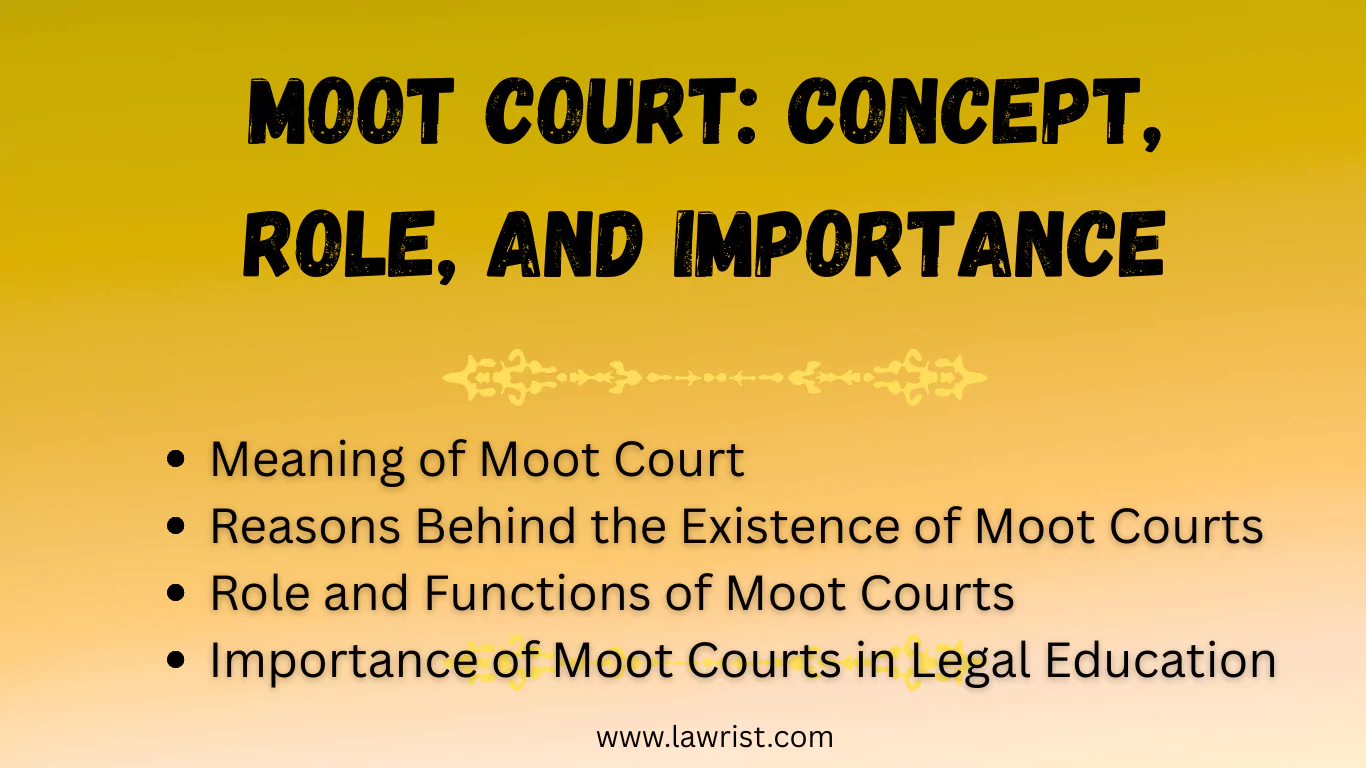Moot courts are academic simulation of court proceedings and usually occur in law schools and universities, where students will present hypothetical cases as if they were in a legitimate court. The moot court experience includes written submissions, oral presentation of their argument, and answering questions posed by the judges. The moot court experience simulates a court process, as moot court work emphasizes legal reasoning, legal research, and advocacy skills versus examination of witnesses and submitting evidence.
Meaning of Moot Court
The term "moot" has its roots in a discussion or debate on hypothetical legal issues. In legal academia, a moot court is a mock court, in which law students advance arguments on a problem akin to that found in real-life disputes. These problems are usually situations that raise unsettled questions of law, so that participants have to think outside-the-box, research comprehensively, and present a reasoned argument before a panel of judges; which may consist of professors, practitioners, or potentially sitting judges.
Reasons Behind the Existence of Moot Courts
Moot courts serve the primary purpose of completing the transition from theoretical to practical legal education. Although legal education is a scholarly endeavor, the law is also a profession in which communication, persuasion and reasoning are essential features. The formal classroom experience and/or learning are only the beginning of this transition, and do not address the means for further education in the essential pragmatics of advocacy. Therefore, we constructed moot courts within legal education for the following:
- Practical Training – To prepare students for real-world litigation by giving them hands-on experience in drafting, researching, and arguing.
- Skill Development – To cultivate oratory skills, logical reasoning, and confidence required for courtroom practice.
- Exposure to Legal Procedures – To familiarize students with legal documents, citations, and court etiquette.
- Professional Grooming – To nurture a sense of discipline, teamwork, and competitiveness that mirrors professional legal practice.
Role and Functions of Moot Courts
Moot courts serve numerous functions in the education and professional development of aspiring lawyers. Here are some of the important functions of moot courts:
- Legal Research Education - Moot problems tend to raise unresolved or complex legal issues and require students to conduct legal research by looking in statutes, case law, and academic articles.
- Drafting and Writing Skills - Students prepare memorials or written submissions so they can learn to draft legal documents that are better structured and more persuasive.
- Oral Advocacy - Moot courts help students develop clarity and articulation, and they help students learn how to think quickly and definitively when answering questions.
- Exposure to senior barristers and judges - Many moot competitions are judged by senior counsel and judges; students benefit from the feedback and exposition to their legal profession.
- Exposure to various areas of law - Moot problems often cover areas like constitutional law, international law, international commercial arbitration, human rights, and intellectual property, which helps students explore many areas of law.
Importance of Moot Courts in Legal Education
Moot courts have evolved into a vital component of legal education as they perform a crucial function in readying students for the demands of professional existence. Such importance can be examined on the following heads:
- Bridging Theory and Practice – Moot courts convert academic knowledge into practical application, ensuring that students understand how law operates in real disputes.
- Confidence Building – Standing before an audience and arguing builds self-confidence and presence of mind.
- Enhancing Employability – Employers often value moot court experience as it reflects a student’s research and advocacy skills.
- Global Opportunities – International moot court competitions provide students exposure to global legal issues and networking opportunities with peers and professionals worldwide.
- Promoting Legal Ethics and Professionalism – Moot courts inculcate respect for court procedure, decorum, and ethical responsibility.
Moot courts are more than just academic exercises, they are vital stages from which law students will cross-over into the accountability of advocacy in the real world. By mirroring current court cases, they give students the ability to further develop their research, writing, and argumentative skills, while narrowing the gap between law and practice and developing the discipline of professionalism. Thus, moot courts are essential to wholistic legal education and will be the stage where students, transition from learning the law into the practice of justice.
